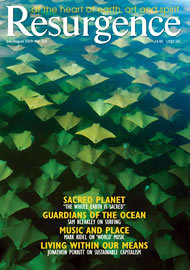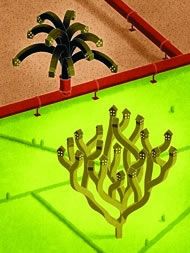The Transition movementis one of those unexpected phenomena in human culture, capturing and mobilising an energy that rarely emerges but is deeply significant for social, political and economic change. This radical movement is grounded in the stark realisation that dramatic transformations are occurring in the Earth’s climate due to humanity’s use of fossil fuels and the release of greenhouse gases into the atmosphere, causing global warming, and that the supply of these cheap fuels, particularly oil, has reached or soon will reach its peak and decline (the ‘peak oil’ phenomenon), potentially creating an economic and social crisis compared with which the present ‘credit crunch’ is a gentle warning.
Awareness of the inevitability of a transition in our culture to alternative, resilient ways of living that are not dependent on the economic growth paradigm led Rob Hopkins to explore ways of facilitating this move when he was living in Kinsale, Ireland, in 2005. His vision was for communities to “go local” in food and energy production and housing and that they should initiate this transformation themselves. It is the positive sense of empowerment this gives to people that overcomes the challenges of such fundamental change. Hopkins then moved to Totnes, South Devon, where he started the local initiative called Transition Town Totnes in 2006. This began with public talks on fossil-fuel dependence and how to find alternatives through collective action in the community.
From this modest beginning, the Transition movement has exploded in the most remarkable way, not simply within the UK but worldwide. The seed planted in Kinsale and then in Totnes has produced a plant that has grown like Jack’s beanstalk with a network of Transition initiatives of different types and sizes. The latest count is 150 in fourteen countries and the number increases weekly. This represents a phenomenal rate of growth in less than three years. The Transition movement could indeed make a fundamental difference to the planet.
Co-ordinating these and ensuring some uniformity of process has been the job of the Transition Network Ltd, a legally constituted charity that oversees with a light touch the different forms of transition that seem appropriate to different scales of action: towns, cities, counties, countries. Its stated intention is to “inspire, encourage, support, network and train communities as they adopt the Transition model in response to peak oil and climate change, building resilience and happiness”.
In 2008 The Transition Handbook, written by Hopkins, was published by Green Books, and it has become the guide for communities seeking to participate in the transition to sustainability.
BECAUSE OUR DEPENDENCE on cheap, plentiful energy has become not simply a habit but an addiction, the Transition movement recognises that some deep work has to be done for people to face the difficult choices confronting them. This takes the form of group engagement in a change of consciousness from focus on the individual, a primary characteristic of Western culture, to opening ourselves to interdependent relationships and community. The first stage of transition is for interested people from a community to form an initiating group that will then go through the steps of awareness-raising and laying the foundation with other existing groups in the community.
The recognition of interdependence engendered is not simply with other people but with the natural world, acknowledging that we are all embedded in the creative web of life that has emerged on Earth through 4 billion years of evolution, giving us the miracle of our living planet. Our co-dependence with the other species with whom we share the Earth is the foundation on which the Transition movement is biologically grounded, and it is the source of the basic concepts that shape the vision.
One of the remarkable features of the Transition movement is that, despite the gravity of our situation, there is a sense of empowerment and excitement that results from inviting people to discover their own solutions to the problems we face. They are not being told what to do. Threat and blame do not liberate people; invitation to participate in designs for radical transformation does. This is a truly bottom-up movement of deep change which people recognise is increasingly necessary.
At the very core of the Transition message about cultivating new, sustainable lifestyles is the belief that human cultures must develop patterns of relationship in community that have the properties of natural ecosystems: they must become resilient, capable of responding adaptively and creatively to shocks and changes such that flexible responses lead to the emergence of new sustainable patterns of living.
Basic to this vision of resilient communities is the localisation of food production, renewable energy, transport and housing. Each community is encouraged to design its own Energy Descent Action Plan whereby it decreases dependence on fossil fuels over a period of fifteen to twenty years. To facilitate this localisation process, local currencies and banks can be developed that transform the economic system from debt-dependence and continuous, unsustainable growth to resilient local trading networks that are creative and adaptable. Local currencies already exist and serve community cohesion and stability in countries around the world, including Switzerland, Sweden and the US, while Totnes and Lewes in the UK have issued their own currencies to facilitate local trading. Local currencies typically flourish in times of economic hardship – for example in America’s last Great Depression – and, given the state of the world economy, there’s every chance we’ll see their ascendance again.
Accompanying these localisation initiatives is the development of local governance, education and health care and the integration of practical skills, arts and crafts into the learning process so that children acquire directly the know-how for living a sustainable life in community that is harmonious with the rhythms and patterns of the natural world. Implementing these changes does not depend on instructions from some central authority but on local decision-making that is self-organising and participatory rather than top-down and hierarchical in its authority structure.
HOW CAN SUCH radical change in the organisation of contemporary society come about? This is another core component of the Transition movement: developing a bottom-up, participatory process for all major decisions in the community. The Transition Network suggests a list of seven principles of transition that enable a diversified response grounded in the local context. These are:
• Positive Visioning: Transition initiatives are based on a dedication to the creation of tangible, clearly expressed and practical visions of community life beyond dependence on fossil fuels.• Trust and Empowerment: Transition initiatives are based on telling people the closest version of the truth that we know in times when the information available is deeply contradictory, and then empowering appropriate responses.• Inclusion and Openness: Successful Transition initiatives depend on the unprecedented coming together of diverse sections of society.• Sharing and Networking: Information sharing and learning are key principles of resilient ecologies that are central to transition.• Building Resilience: How communities respond to shocks is critical to the transitional path beyond fossil-fuel dependency. The movement is explicit in its intention to build resilience across key economic sectors (including food, energy and transport) and across a range of appropriate scales – from local to national.• Inner and outer transition: Transition is a catalyst to shifting values and unleashing the energy and creativity of people to do what they are passionate about.• Subsidiarity: Self-organisation and decision making at the appropriate scale are key principles drawn from resilient ecological systems.
Many attribute the success of the Transition movement to its emerging holographic structure, which mimics cell growth within living organisms. The network aspires to simultaneously maximise local autonomy and maximise coherence at the macro-level through shared learning and purpose.
IT HAS BECOME clear in recent years that the economic system is intrinsically unsustainable and inequitable. It is destructive of ecosystems and cultures alike in its homogenising impulse, destroying the diversity that is the foundation of resilient natural and cultural systems. However, the structure and properties of trading and exchange systems are ours to choose. Our recent experience with the toxic properties of unregulated capitalism has made it clear that we need to find other ways of carrying out exchange and trade that are more in line with the properties of natural ecosystems.
A primary source of instability in our current economic system is continuous growth, which uses up the Earth’s resources inefficiently and is driven by the monetary policy of lending with interest. This makes growth necessary to recover debt. However, there is no reason why community banks should not provide loans to savers without interest, which is a principle used by a number of successful banking schemes in Sweden, Switzerland and other countries. An economy that does not enslave people to debt is one in which they retain their freedom and empowerment.
Since natural ecosystems remain in balance with the resources available to them and with one another, we can ask if there is some regulatory principle that is natural to human communities so that they could likewise maintain an equitable harmony with their bioregions. It appears that there is indeed such a principle, which could balance quantity of goods traded with quality of life. The basic idea is that as trading activity increases, facilitated by money, people’s basic needs become satisfied and there is an opportunity for them to find lives of meaning in relation to one another in community and with the natural world.
However, if trading activity becomes dominant, people spend more time working than experiencing wellbeing in family and community. Then the quality of their lives decreases and this is experienced as a loss of meaning and quality of lived experience, which people are encouraged to compensate for with more quantity of goods and money. This is the retail therapy that is notorious in our culture: a desperate attempt to fill the quality gap with quantities of consumer items. Because community has been destroyed, people often fail to notice this because of an absence of the relationships required to evaluate quality of life.
This positive feedback loop leads to the disintegration of society as people search desperately for ways of finding meaning, usually through the accumulation of money. This inevitably fails. The first step in restoring the natural balance between freedom and responsibility, between people and Nature, is to recover community, which is precisely what the Transition movement focuses on. It is people’s hunger for meaning and quality in relationship that seems to be driving the Transition movement along a path to social, political, economic and ecological transformation.
AS WE MOVE into the unknown territory of post-peak-oil economies, how can we be sure that transition ideas will create more sustainable and resilient ways of living? The answer is that we can’t, and we need to recognise that Transition is a social exploration somewhat along the lines of Nature’s evolutionary experiments, which continue all around us. Transition’s playful seriousness encapsulates this experimentation and lack of certainty with this “cheerful disclaimer”from the Transition Towns website: “We truly don’t know if this will work. Transition is a social experiment on a massive scale. What we are convinced of is this: if we wait for the governments, it’ll be too little, too late; if we act as individuals, it’ll be too little; but if we act as communities, it might just be enough, just in time.”
www.transitiontowns.org www.transitionculture.org Brian Goodwin teaches at Schumacher College in Devon, UK. He has written a number of books, including Nature’s Due.







